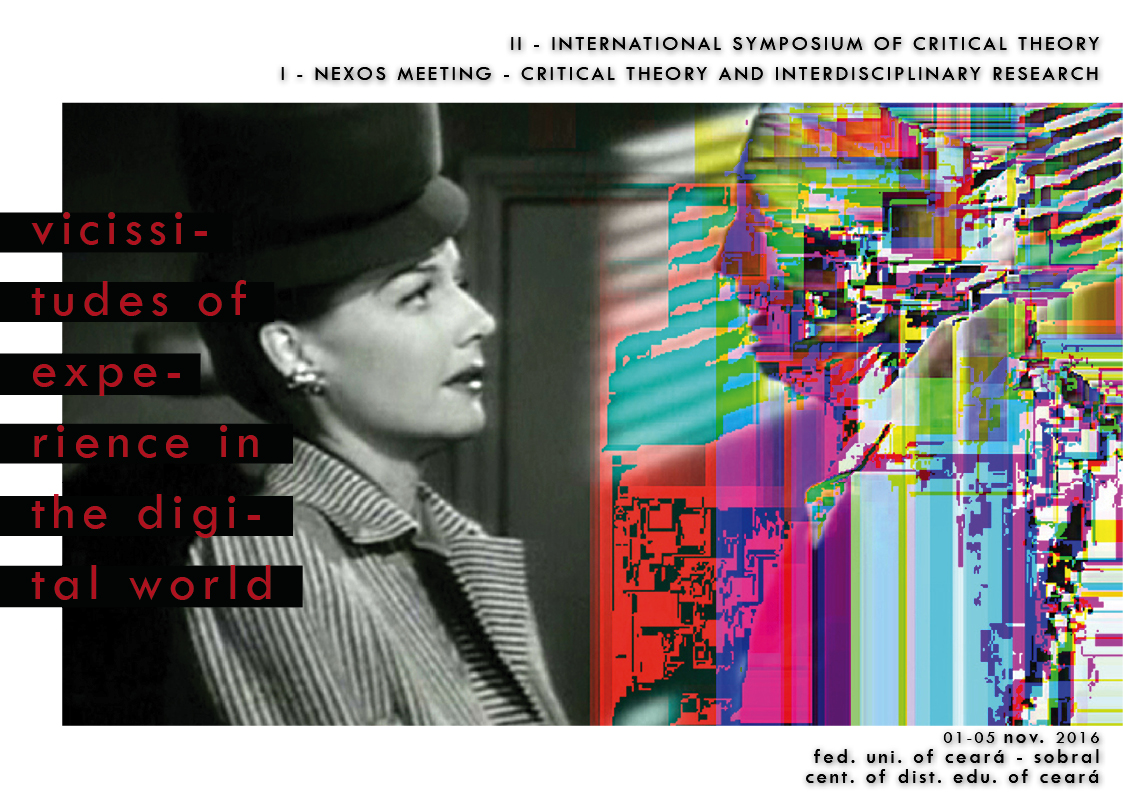Meeting Introduction
- Details
- Category: Site
- Published on Tuesday, 30 April 2013 18:13
- Written by Conselho Escolar
- Hits: 1559
II International Symposium on Critical Theory and First Meeting NEXOS: Critical Theory and Interdisciplinary Research: "Vicissitudes of experience in the digital world"
In 2016, the Undergraduate Academic Program in Psychology at the Federal University of Ceará (UFC) celebrates its decennial. Its staff is composed of young, feisty and widely qualified professors, most of whom hold a PhD or are graduate students in fields such as Psychology, Philosophy, Social Sciences, Public Health and Education. This staff is highly productive and open to academic innovation and research. It is not a coincidence that many of them are bound to the Graduate Program in Psychology as well.
The Master Program in Psychology at the UFC began its operation in 2003, aiming to qualify professionals for high level teaching, research, as well as for expanding professional abilities in fields of social relevance. In more than a decade of existence, the Master's course has trained 208 teachers and researchers, and has been transformed according the maturation of their corpus of supervisors. The proposal of establishing a Doctoral Program strengthened professors’ commitment with a scientific construction as well as remaining close to the regional and Brazilian reality. In 2013, the Doctoral Program was approved with high recommendations by Brazilian scientific institutions, and started its activities in January 2015.
In order to consolidate the practice of promoting scientific meetings in Psychology with an interdisciplinary approach at the Federal University of Ceará, the project Prisms: Center for Studies in Critical Theory, Cultural Industry and Social Psychology (UFC-Sobral), the research network NEXOS: Critical Theory and Interdisciplinary Research (with research groups consolidated in Northeast, Southeast, Midwest and South Brazil), and expert professors on “Subject and Culture in the Contemporary Society” at the UFC are all organizing in 2016 the II International Symposium on Critical Theory, and the First Meeting NEXOS: Critical Theory and Interdisciplinary Research: "Vicissitudes of Experience in the Digital World". It is a common concern among these three groups that "the inclusion of Psychology in critical and ethical debates about contemporary culture, including the Psychology interfaces with related fields", like the line of research in “Subject and Culture” suggests. In this sense, it is important to "reflect on various aspects that affect contemporary subjectivities, namely: the culture of consuming, the media, the experience of time compression, new technologies and other significant factors of late-modern condition" [1].
The choice of the city Sobral/CE to host the Second International Symposium on Critical Theory and the First Meeting NEXOS: Critical Theory and Research Interdisciplinary: "Vicissitudes of experience in the digital world" is due two main reasons. First, the city has promoted technical-scientific advances since the installation of the campus UFC/Sobral ten years ago. Second, this event helps to increase partnerships among college institutions present in the city (State University of the Acaraú Valley, Luciano Feijão College, INTA), strengthening ties and promoting advances in the Ceará State’s fields especially regarding scientific and academic development.
This event includes the important participation of American researchers and a new generation of Brazilian scholars in Critical Theory. Critical Theory studies have grown in the country in recent years with the establishment of dialogues with other Latin American (mainly Argentina and Mexico), American and European countries, going beyond more traditional and endogenous studies. In 2014, we celebrated the 50th anniversary of publication of the One-Dimensional Man, by Herbert Marcuse. On this occasion, the First International Symposium of Critical Theory: 50 Years of the One-Dimensional Man – New Ways of Thinking Totalitarian Democracy occurred in the State University of Maringa (UEM), organized by Professor Robespierre de Oliveira. At that time, based on Marcuse’s work, discussions centered on the new forms of totalitarianism blooming in modern democratic societies. The proposal of the Second Symposium is to go further and deeper into this debate, starting with the maturation that has occurred since the first meeting, in addition to strengthen The NEXOS Research Network. The NEXOS’ members have had regular meetings, both in person and through the use of technological resources (because of the wide distance among their places). Digital technology has helped to maintain group meetings, in which it is possible to discuss, reflect and develop research with a critical position in relation to contemporary events, such as the increasingly excessive and open expressions of hatred in social networks.
Digital technologies, and more specifically social networks, appear as an inherent contradiction: while providing ways of resistance against conservative positions – role intended by the NEXOS itself –, it is also true that they promote widely spreading of conservative thinking in its worst aspect, already denounced by authors of the so called Frankfurt School: curtailing the experience of otherness and openness of sensibility, fostering the imprisonment of individuals in a binary structure of thought (Ingroup/outgroup) – which is partly related to the own structure of this technology [1]. Whether technologies are means able to represent our subjective world, they also introduce themselves as a "medium for materialization and creation of types of vision, which requires to understand that each time builds their own perceptions, scaled with dominant technologies" [2].
The Second International Symposium on Critical Theory and First Meeting NEXOS: Critical Theory and Interdisciplinary Research: vicissitudes of experience in the digital world” seeks to understand the current society through an interdisciplinary dialogue by researchers from various fields of social sciences and humanities such as Psychology, Philosophy, Education, History, Sociology, and the Arts, contributing with their vision of Critical Theory and digital technologies. This discussion is of great importance today considering that these technologies provide the subjective experience in the meanders and waywardness of their playing.
Best regards,
Organizing Committee.
[1] http://www.pospsi.ufc.br/index.php/pesquisa/linhas-de-pesquisa
[2] Silva, Armando. Imaginários, estranhamentos urbanos. São Paulo: Edições SESC, 2014. p. 41.



